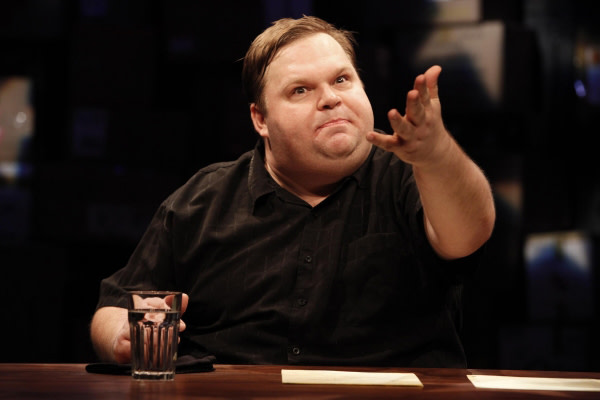TBA 2011: PNCA Students Describe Daisey

Have you recovered from 24 hours of Mike Daisey yet?
Or maybe you’re in TBA withdrawal? I sort of am (and Portland withdrawal in general), back here on the East Coast. So it was great to get reports from several Pacific Northwest College of Art students, who, under the auspices of Barry Sanders’ creative writing course, attended “All the Hours in the Day” at various points. Here they are, a collective postmortem of sorts:
3 a.m.: After a hilarious hour spent watching hot vegans sizzling salty thick-cut bacon and also after eating a slice—and replenishing my coffee—I reentered the theater. Let me be clear from the start, this was the only hour that I attended for which I have zero notes. My notebook remains blank.
Mike Daisey began by talking about his unhealthy relationship with his high school girlfriend that shouldn’t have continued into his senior year of college. They both knew the relationship lasted too long. Now time was magnified by the fact that his girlfriend was—unknowingly to him—eight months pregnant. It wasn’t until her friend staged an intervention that she finally told him. They talked and talked for hours. Calm. They decided to give the baby up for adoption.
The picture Daisey paints is tragic. A baby that shouldn’t be. She never gave it up for adoption. Now, years later, he understands why she didn’t. After the pregnancy he describes the depression that he fell into. The nights he lay naked, trying endlessly to pull himself out of his desolation. “It’s the easiest thing in the world,” he says to himself while trying to move.
At this point I am starting to feel the weight of the gun on Daisy’s table. I am starting to feel the hole in my chest dilate. Himself as a character in his story begins to develop a routine. Every night he pulls himself out of his slumber, dresses himself and walks out into the air. It’s summertime in central Maine and he walks the abandoned streets. He walks past the burned down Boy Scout camp continuing toward the lake. Once at the lake he undresses and walks out into the crisp water. He keeps walking until he decides it’s times to float. The dead man float. He does this for hours until he can no longer stand the water. The man on stage then quickly and noisily sucks on his lower lip. As the months wade on in his story, so does the somber tone. The theater feels darker. It’s now late October in Maine. He has to push chunks of ice aside as he walks out into the water. On this particular night the lake is arctic. He can feel his diaphragm retracting as it rejects the frigid temperature. He expects the impending surge of adrenaline as his body tries to fight for the life he is so willing to give to this lake in Maine that lies just past the burned down Boy Scouts camp.
Not a soul moves in the audience. My tear ducts are betraying me. He swims back to shore. I come back to reality. It is now 3:45am and Mike Daisey has already turned his page and walked offstage for the break. The gun remains.
–Megan Savoy
6:32 a.m.: In the quiet at the break of dawn, a voice cuts through the whisper of nature’s white noise, to reveal a message in the style of a sermon. Mike Daisey stands atop the stage located in the Beer Garden of The Works dressed fully in black. Behind him a view of the city; above him the light rain falls atop us all, as he welcomes us to his church. He recites to us the message of the importance of living the human experience. A crowd surrounds him, some in pajamas and comfy clothes and most with rain jackets on. He tells us of why the world can be so difficult; he says it is because it is trying to grind us all down into a certain shape. He explains how our minds create thoughts that mimic IKEA furniture, in that we build it ourselves and no matter how hard we try to build our thoughts into perfection, they still “end up just a little fucked up.” He points to the sky, to us and to the world and tells us of our need to carry on; our worth in being present in our human experience. He notes that he is not perfect and that neither are any of us, but in this time that we spend united we are bringing fear to those who want to break us.
As his sermon comes to a close, Daisey invites a young woman with beautiful curly bright hair on stage and she invites us to sing along to Amazing Grace. One by one the crowd shows the camaraderie that has built from the many hours spent together, by sharing in the song. For some, tears manifest and for others smiles. It is a beautiful moment to be alive; together with humanity. The dawn daylight grows brighter while we all squint and rub our eyes to slowly adjust.
Was blind, but now I see.
— Nina Diaz
6 p.m. When something is able to reach into the catacombs of my thoughts and pull me into the light, it is undoubtedly due to a great measure of control, drama, and honesty. I am moved by genuineness and Mike Daisey truly fills the order. His truthfulness is questionable but his methods are infallible and in the final hour of this performance I genuinely believe that this could be the last time he ever performs. The last 45-minute session is dripping with implications of an ultimate end not only to this monstrous feat but also a violent end to his life by the pistol resting menacingly to his left. The pistol, one hand’s length away from pitting us against Daisey in fear of losing the constant voice that grounds us in some form of a hazy, but compelling, reality; one gesture away from testing our moral constitution. His words are building. His characters are finding their end. The audience is waiting for theirs. The conductor’s crescendo, his opus. The final statement:
“There is not enough time to tell you everything you need to know.”
He Bows.
We cheer.
We sing: Lean On Me
—Riley Huston




